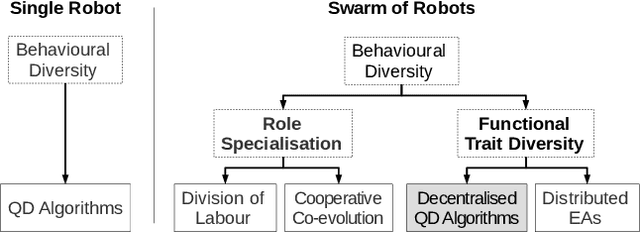Evolution of a Functionally Diverse Swarm via a Novel Decentralised Quality-Diversity Algorithm
Paper and Code
Apr 20, 2018

The presence of functional diversity within a group has been demonstrated to lead to greater robustness, higher performance and increased problem-solving ability in a broad range of studies that includes insect groups, human groups and swarm robotics. Evolving group diversity however has proved challenging within Evolutionary Robotics, requiring reproductive isolation and careful attention to population size and selection mechanisms. To tackle this issue, we introduce a novel, decentralised, variant of the MAP-Elites illumination algorithm which is hybridised with a well-known distributed evolutionary algorithm (mEDEA). The algorithm simultaneously evolves multiple diverse behaviours for multiple robots, with respect to a simple token-gathering task. Each robot in the swarm maintains a local archive defined by two pre-specified functional traits which is shared with robots it come into contact with. We investigate four different strategies for sharing, exploiting and combining local archives and compare results to mEDEA. Experimental results show that in contrast to previous claims, it is possible to evolve a functionally diverse swarm without geographical isolation, and that the new method outperforms mEDEA in terms of the diversity, coverage and precision of the evolved swarm.
 Add to Chrome
Add to Chrome Add to Firefox
Add to Firefox Add to Edge
Add to Edge